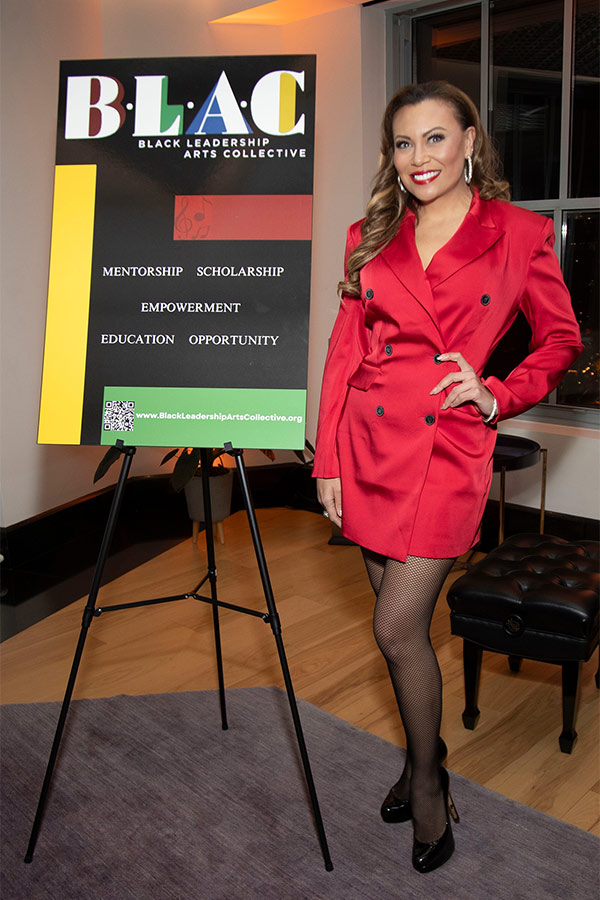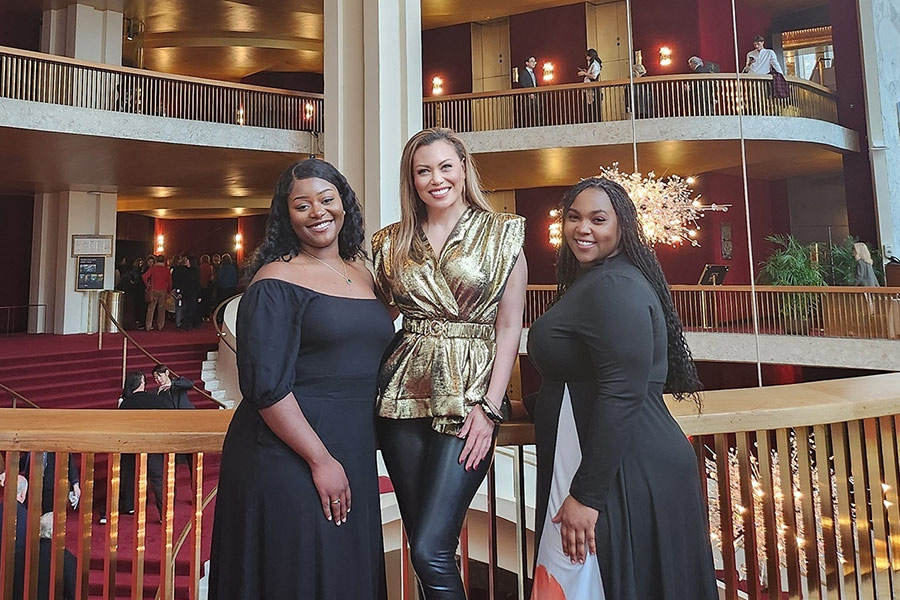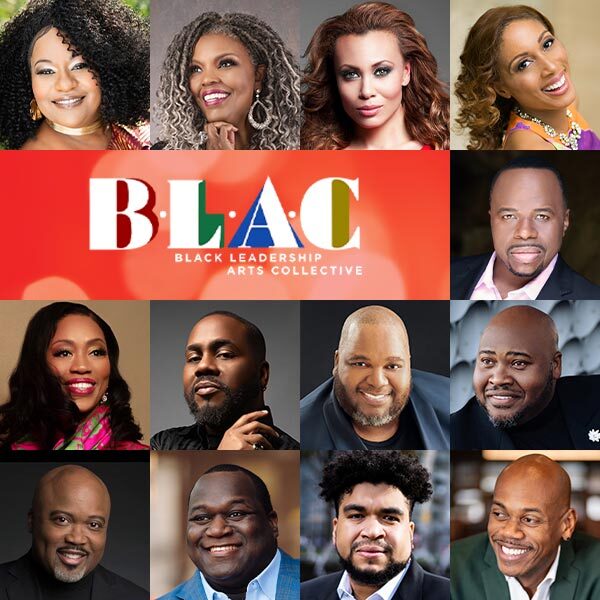October 22, 2025
Paying it forward: A conversation with Alyson Cambridge
The Black Leadership Arts Collective, comprised of eight of the leading Black classical vocal artists and musicians performing today, started as a way for professionals to reconnect in the wake of the pandemic. In just a few years, the organization has grown significantly, and now mentors a select group of young singers from across the country. Here, Executive Director Alyson Cambridge reflects on this concert, marking the group’s second gala celebration, and on the very personal aspect of helping young talent find their way.
Echoes of Excellence is quite a collection of talent and repertoire — how did it come about?
Late last year, the Board and I were brainstorming about this project and talking about how we wanted to move the gala from a music school here in Manhattan into other major cities around the country. Chicago came up right away. And we said, “Well, if we're going to do programs and galas in different cities each year, we should make it specific to each city, right?” So, we decided to pay tribute to some of the greatest Black opera singers who have appeared on the stage at Lyric.
A great idea — but just a concept at first.
Once we got the different artists involved, we knew that we wanted to play on every individual's strengths. With the great baritone Kenneth Overton, one of our BLAC Board members, I sent out a survey of repertoire choices and suggestions. Kenneth is encyclopedic in general, but he did his research and we came up with a robust list of the Black operatic legends who have sung at Lyric. Leontyne Price. Some great Verdi men. Jessye Norman. We also asked the current artists for ideas about spirituals or songs by composers, living or past, with connections to Chicago. And from those results we put together a program where everyone would be able to shine.

So you, for instance, will sing the Habanera from Carmen.
We’re a bit short of mezzos. Although I classify myself as a soprano, and I'm a bit of a zwischenfach, so while I sing roles like Bess and Tosca, Carmen has actually also become one of my signature roles over the past few years. So yes. I’ll be honoring Grace Bumbry, who sang 10 or 11 roles at Lyric, including Carmen in 1964. Interestingly, her career was similar to mine in that she sang a range of both mezzo and soprano roles.
She is one of the many legendary singers referenced on this program.
I have had the honor of meeting several of the legends we are paying tribute to, including Ms. Bumbry.
Amazing!
Yes. Way, way back when I was a young artist at Opera Theatre of St. Louis. I actually sang on a Masterclass for her. There are people who just have that It factor and have a wow presence and a regal bearing, and she was certainly one of them.
In a way you are a perfect example for the concept of this concert. Is this kind of an embodiment of what BLAC does?
B.L.A.C. officially formed in 2023, but it was initially just meant to be people getting together and finding community after the pandemic. In the summer of 2021, the founding members had the idea to have a gathering (they called it the “Cuzzins Cookout”) in New York City, where Black vocalists and musicians could attend, for good times, food, and kinship. At the cookout, they noticed a lot of the younger artists were asking the older artists for advice.
So, the next summer, they thought to incorporate a master class. In the years in between, it became clear that there was a need amongst young Black singers for mentorship and scholarship, and for creating more performance opportunities for them. I became a part of B.L.A.C. at the end of 2024, and our goal continues to be to keep growing and building, raising awareness of the importance of our mission and creating more of these important opportunities and experiences for the artists we support.

Alyson Cambridge poses with B.L.A.C. mentee singers at The Metropolitan Opera.
There wasn’t something like this in place for those talents?
There are so many organizations that do support young artists and musicians in wonderful ways. What I think is so important and special about B.L.A.C. is that it is so specific. Our mentorship weekend is a good example. We have our four mentees, and we fly them into New York for three days. They arrive on a Friday afternoon, then they leave Sunday evening. We took them to the Met — the first time ever for several of them. We took them out to dinners and got to spend quality time with them. Voice lessons, a Masterclass, career panels, and a headshot photoshoot session for all of them.
The whole Board was involved with this?
Yes. It is one of the things about which we are most proud. We all remember when we were coming up in the industry. When I moved to New York, I was 23. I had just won the Met Competition, and started in the Lindemann Young Artist program. I was so green. And there was Morris Robinson, who, of course, has sung at Lyric, and he was a third-year artist in the program. He said, ‘I just want you to know I'm here for you.’ Frankly, 25 years ago, there weren't lots of singers of color singing on major operatic stages. There just weren't. Morris was one of them, and he was so supportive and kind to me. A few years later, Larry Brownlee would make his Met debut. I remember becoming friends with him, too. I remember the fellowship, the nurturing and the advice that they gave to me as a young Black singer. But it was few and far between. And so we’ve realized there's still a need for more. We have all gotten to a certain point in our respective careers, and we want to pay it forward.
What are some other examples of the specificity you mentioned?
These young singers ask questions like, ‘Hey, I've got an audition. What do I wear?’ 'I have an audition for such and such company. I don't want to sing something from Porgy and Bess because I don't want to be typecast.’ ‘I'm auditioning for this particular agent, but I want to be considered for all repertoire. What do you suggest?’ We go through their repertoire. There are lots of audition fees, travel fees, wardrobe, voice lessons, coachings — the list goes on. If you're not in a program like the Lindemann or the Ryan Opera Center, you've got to do it on your own. All of those things are expensive. And so we, as an organization, provide that financial support.
Being smart in the area of finances can be challenging.
That’s part of why we provide much more than just that weekend in New York. Taxes, and international currencies, and even commissions, and agents, and what percentages you should expect to be paying, all of that. The opera world is ever-changing. The climate in this country is ever-changing, and these young singers are having to navigate it. We want to be the organization to help them do that in the most loving and supportive way.
I know you’ll be thinking of Grace Bumbry as you prepare for this performance. Do your fellow singers feel similarly about their predecessors?
Oh, yes. Absolutely. They paved the way for us all to be here. This is really a one-of-a-kind concert. To do an 85-minute recital that is of all Black singers, arguably some of the best in the world, one night on stage paying tribute to those legends that inspired them — that's a big moment. I think all of us on the program realize the profound significance and wonder of it all. Presenting this concert at Lyric Opera of Chicago is just an immense moment of pride.

